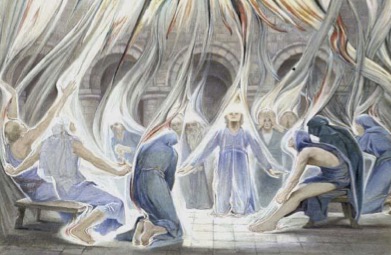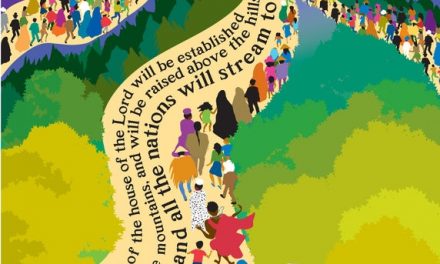The readings for this Sunday may be found on the USCCB website:
- Acts 2:1-11
- Psalm 104:1, 29-31, 34
- 1 Corinthians 12:3-7,12-13
- Sequence: Veni, Sancte Spiritus
- John 20:19-23
When we come to the topic of Pentecost in my introductory Theology classes, I typically ask my students to discuss how they would explain the difference between “unity” and “uniformity” on the one hand, and “division” and “diversity” on the other. The responses they report are usually quite insightful. Invariably, some of them will observe that diversity is often a feature or even a requirement for unity within the interpersonal sphere, and therefore uniformity, to the extent that it impedes or negates diversity, may actually stand in direct opposition to true unity. “Very good,” I tell them, “so now, what does all that have to do with Pentecost?”
Pentecost is the moment when the Holy Spirit, the Advocate and Spirit of truth promised by Our Lord, descends in fullness upon the disciples gathered in Jerusalem. It is the event that brings the Church into existence, and since the Church is Christ’s Body in the world, one might also say it is a kind of “second Annunciation” in which the eternal Word of God unites Himself once again to humanity, this time to the corporate instantiation of humanity that nevertheless remains His Body in the world. Christ identifies Himself with the Church so utterly that on the road to Damascus, He asks Saul “why are you persecuting me?” That same man would later describe the Church as the Bride of Christ, for whom Christ gave His life and with whom Christ unites Himself with the same degree of intimacy as when spouses become “one flesh” in the marital union.
So there is certainly unity here, but of what sort? Is it the flattening unity of uniformity, or the variegated unity of diversity? On the surface, one might suppose it is the former, since one becomes a member of the Church through baptism, in which an individual becomes assimilated to Christ by being immersed into His death and drawn out into His resurrection. In joining the Church, one’s life becomes Christ’s, not only in the sense of belonging to Christ but also in the sense of assuming or embodying Christ’s very identity. In baptism, the members of the Church become “little Christs” whose ultimate vocation is one and the same: to conform oneself more and more to Christ.
Yet this conformity is not the one-to-one conformity of mere imitation; it occurs within the corporate reality of a living Body with as many functions as it has members. The conformity that characterizes the Christian life is a progressive integration into an organic unity that by definition requires the proper differentiation of diverse parts. The Church’s “oneness” therefore implies a diversity that is as vast and varied as humanity itself.
In this respect Pentecost is the reversal of Babel, where humanity sought its identity – “to make a name for itself” – through the illusory security of uniform speech and action. Those in Babel wanted to keep all of humanity in one place, behind the walls of a single city, under the authority of a single tower. It was essentially a refusal to embark upon the adventure of diversity, to shrink back from the risks and uncertainties of difference. God had to push humanity out of this stultifying rut so that it might realize the great diversity of languages, cultures, and ethnicities He intended it to embody. Yet as we well know, this diversification also brought with it great division: wars, racism, subjugation, genocide. We could not escape the fact of diversity, but we have almost perpetually raged against it.
Yet in descending upon those who were “all in one place together” awaiting His coming, the Holy Spirit “parted and came to rest on each one of them.” In the Church, the reality of God’s presence in the world is essentially corporate, yes, but it is also an indwelling of God’s Spirit in each. The same phenomenon that happened at Babel then occurs among these disciples – they begin to speak in different languages – but the effect is the opposite. The people from all over the world gathered in Jerusalem for Shavuot “were astounded, and in amazement they asked, ‘Are not all these people who are speaking Galileans? Then how does each of us hear them in his native language?’”
Something new has come into human history at this moment: a true society whose unity does not reside in any common ethnic identity, cultural heritage, or earthly authority. It is a true community (“God’s family in the world” as Pope Benedict XVI once described it), and yet it remains as unrestrictedly open to diversity as it is to its potential membership. It is a people truly open to those of every race and tongue, which does diminish but rather amplifies the particular identities and differences of those who belong to it. That is why on Pentecost the Church sings Psalm 104, the great ode to the vast and delightful diversity of creatures in the world, even those who seem to have nothing to do with humanity, such as the Leviathan, whom God formed to frolic in the sea. This Psalm always reminds me of Gerard Manley Hopkins’s poem Pied Beauty, which glorifies God for
“dappled things…, for rose-moles all in stipple upon trout that swim…,” for “all things counter, original, spare, strange; whatever is fickle, freckled (who knows how?) with swift, slow; sweet, sour; adazzle, dim; He fathers-forth whose beauty is past change: Praise him.”
That poem, I submit, beautifully captures the miracle of Pentecost, in which the Spirit opens our eyes to the truth of things, so that we might accommodate and celebrate the full scope of creation’s, and particularly humanity’s, diversity.
The unity of the Church depends upon this vast diversity. St. Paul emphasizes this point when he insists that in the Church “there are different kinds of spiritual gifts…, different forms of service…, different workings” among its members, but “the same Spirit…, the same Lord…, the same God who produces all of them in everyone.” The manifestation of the Spirit is what holds the Church together, but that manifestation occurs individually, one by one, for the benefit not only of the Church but ultimately for the full flourishing of each and every child of God. When Christ breathed upon His disciples so that they might receive the Holy Spirit, He presumably did not simply blow indiscriminately into the air, but must have breathed on each and every one of them, as God breathed the breath of life into Adam. The Spirit that gave life to all things now gives each of us a new form of life, elevating us so that might participate in that eternal dance of God’s own life in which we will all behold, to our shock and delight, the true inimitable uniqueness of every creature bearing God’s image.




